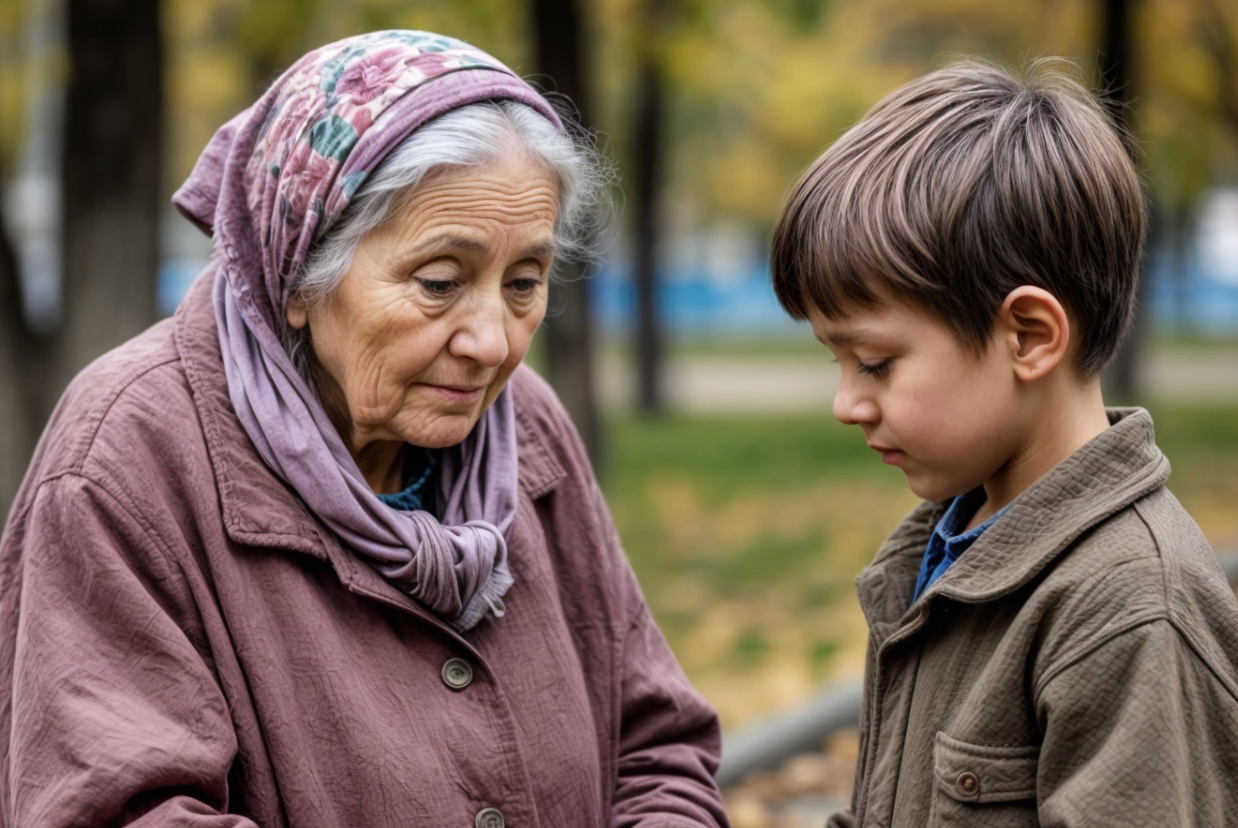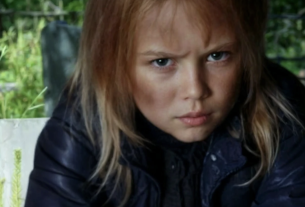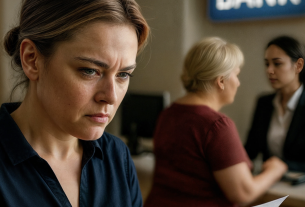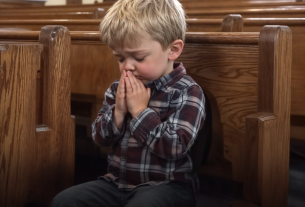Sunlight, filtering softly through the sheer curtains, gently fell upon a photograph in a silver frame—a snapshot frozen with the smile of a woman whose life was cut far too short. Vlad sat in his chair, motionless like a statue, silently gazing at Valya’s face. His eyes no longer wept, but inside, everything tightened as if invisible hands were squeezing his heart. The tears had dried up, leaving behind a bitterness like the salty taste on the lips after long crying.
“Ah, Valya… Only 34 years… A whole life ahead… To live and live…” — thoughts pierced his mind like bullets. Nine days. Nine days since he stood by the fresh grave, feeling the ground give way beneath his feet. Nine days since he last heard her voice, saw her profile, smelled her scent—light, with a hint of vanilla and something otherworldly.
Vlad was eight years older than his wife. At forty-two, he considered himself mature, balanced, responsible. He saw Valya as a fragile being needing care, like a flower that could wither without constant attention. He believed she was delicate, unprepared for the cruelties of the world. But he was wrong. Wrong from the very start. In reality, behind her graceful appearance and melodious voice lay a sharp, cunning, calculating mind. Valya knew how to manipulate, deceive, disappear when it suited her. She lived by her own rules, not thinking about consequences.
Their story began ten years ago—in that very night when fate brought them together amid the noisy, bright crowd at a party hosted by mutual friends. By then, Vlad was already a successful entrepreneur. His business was growing, income increasing, and opportunities unfolding like a map of an unexplored world. He was in the spotlight, but suddenly his gaze caught on a solitary figure by the window.
A dark-haired girl in a tight black dress sat in the corner, like someone from a fashion magazine cover. Her eyes—deep as a dark lake—looked into the distance, and she held a glass of burgundy wine. Valentina. At that moment, to Vlad she was not just beautiful—she was a mystery, a challenge, a magnet impossible to resist.
He waited until her glass emptied, and with a full glass in hand, approached like a hero from a romantic film.
“May I join you?” he asked with a light smile.
“Aren’t you afraid I’ll refuse?” she replied, looking at him with a sly sparkle in her eyes.
“I am,” he admitted honestly. “But the risk is worth it.”
Their conversation flowed like music—easy, effortless. They spoke of books, travels, stars. Valya was intelligent, witty, with a sense of humor sharp as a razor. Vlad was enchanted. He felt his heart beating faster, as if for the first time in a long while, it remembered how to love.
Later he learned that Valya was there purely by chance. She worked at a flower stall where party guests bought roses and lilies. Overhearing the chatter, she decided to look in—just to see how “others” lived. But Valentina never did anything just like that. She came not out of curiosity but for a chance. And she grabbed that chance.
At that time, Vlad was married. He had a son from that marriage, but his relationship with his wife had long turned into a cold routine. Only their son, Arkasha, kept them together. But when Valya appeared, everything changed. She was like a hurricane—beautiful, destructive, inevitable.
After six months, Vlad filed for divorce. A year later, he married Valya.
However, the family idyll was an illusion. Valya, now wife and mother, had not changed. She continued going to expensive salons, spending money on designer bags, meeting friends in trendy bars. She barely noticed the child, Denis. “He’s a nuisance,” she said. “I need to breathe!”
In the end, Denis was taken by Vlad’s mother—a elderly but caring and loving woman. She raised her grandson as her own, without complaint or demand for gratitude.
Then tragedy struck.
One Monday morning, Vlad received a call. The doctor’s voice was dry as paper:
“Your wife was in an accident. She’s in intensive care. Come quickly.”
He dropped everything and rushed to the hospital. But it was too late. Valya had died. Without waiting for him. Without saying goodbye.
Death came suddenly, leaving behind a void impossible to fill.
Vlad buried his wife. Buried a part of himself.
A few days later, he took Denis back. The grandmother was over seventy. She was tired. Her heart, back, and soul ached. Vlad could no longer let her bear that burden.
He hired a governess—Dasha. Young, modest, with warm eyes and a soft voice. She arrived with a backpack and a dream to start a new life.
“Do you have a place to live?” Vlad asked.
“For now, at a friend’s,” she answered. “But I’ll find my own place.”
He looked at her and suddenly felt something stir inside—not passion, not love, but something warm, almost familial.
“Stay with us,” he offered. “There’s enough room.”
And she stayed.
Dasha turned out to be more than just a nanny. She became part of their life. She cooked with love, taught Denis to read, sing, draw. Walked with him in the park, played snowballs, read bedtime stories. Vlad raised her salary, but she asked for less—she needed to feel needed.
The first days after Valya’s death, father and son spent together. Whole days playing video games, laughing, eating pizza, watching cartoons. Denis was happy.
But one Saturday in the park, the boy noticed an elderly woman on a bench. She sat alone, head down, trembling from the cold.
“Dad,” Denis said quietly, “let’s give her some bread? We bought it for the ducks… But she’s probably hungry.”
Vlad and Dasha exchanged looks. Approaching, they saw the old woman wiping tears.
“Can we help you?” Vlad asked.
The woman silently took out a notebook and wrote:
“I’m lost. Please help.”
“Do you know the address?” he asked.
She nodded and wrote: “Lesnaya Street, 17.”
Vlad froze. It was his address.
“Why are you going there?” he asked, stunned.
The old woman slowly wrote: “My daughter lives there. Valentina.”
“Valya is no more…” he whispered.
The woman closed her eyes. Her shoulders trembled.
Then she put a worn envelope into Vlad’s hand. On it was written: “For Valentina.”
At home, Vlad opened the letter. Word by word, line by line, he read, and the world around him crumbled.
In the letter, Valya’s mother wrote about illness, about the leaking roof, about living in utter poverty, about writing to her daughter many times, but the letters returned.
“I am your mother. I am alive. Why don’t you answer?”
Vlad felt his blood freeze in his veins.
“She… she was not an orphan,” he whispered to Dasha. “Valya lied. She was ashamed of her mother. Ashamed of the village, poverty, the old woman who gave birth to her.”
“What will you do?” Dasha quietly asked.
“I’ll help,” he answered. “This is my family. She’s my son’s grandmother.”
He went to the village. Saw the house—crooked, with peeling paint. But inside—cleanliness, coziness, the smell of dried herbs.
He repaired the roof, installed water, bought furniture. Met the neighbors. Started spending weekends there. Then weeks.
Over time, he realized: he no longer needed the city. Here, among forests, fields, and silence, he felt truly alive.
One day, by the lake under a starry sky, he turned to Dasha and said:
“Stay forever.”
She smiled.
A year later, they married. The wedding was in the village. Simple, warm, like a sunny day.
Next to Valya’s mother’s house, they bought the neighboring cottage. The whole family moved there—Vlad, Dasha, Denis, and grandmother.
Sometimes in the evenings, they sat on the porch, drank tea with raspberry jam, and watched the sun set behind the forest.
Life, which seemed broken, began to find new meaning.
From pain was born something beautiful.
From loss—love.
And in Vlad’s heart, peace finally reigned.



